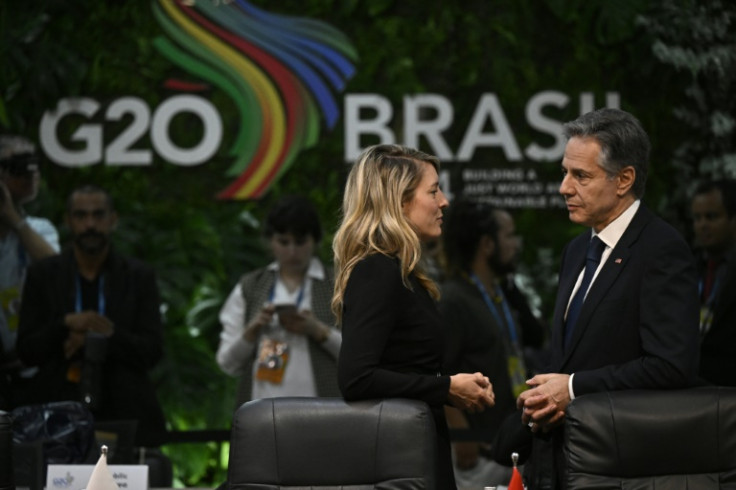
G20 nations broadly back a two-state solution to the conflict in the Middle East, host Brazil said Thursday after a meeting of top diplomats, adding to pressure on Israel to accept an independent Palestinian state.
The message from the meeting of G20 foreign ministers in Rio de Janeiro came a day after Israel's parliament overwhelmingly voted for a proposal by Prime Minister Benjamin Netanyahu to oppose any "unilateral" recognition of a Palestinian state.
More than four months into Israel's military campaign in the Gaza Strip, the Group of 20 leading economies voiced "virtual unanimity for the two-state solution as the only possible solution" to the crisis, Brazil's top diplomat, Mauro Vieira, told journalists at the close of the two-day meeting.
"The only reason (Vieira) didn't simply say 'unanimity' is that not every speaker addressed the issue," a Brazilian foreign ministry source told AFP.
"Every (minister) that addressed the issue voiced support" for a two-state solution, "and it was a lot" of ministers, he said.
The meeting brought together top diplomats including US Secretary of State Antony Blinken, Russian Foreign Minister Sergei Lavrov and EU foreign policy chief Josep Borrell.
Borrell had urged Vieira to use his closing statement "to explain to the world that at the G20, everybody was in favor" of a two-state solution, with an independent Palestine co-existing with Israel.
"It was a strong request for a two-state solution," Borrell told journalists.
"The common denominator is that there's not going to be peace, there's not going to be sustainable security for Israel, unless the Palestinians have a clear political prospect to build (their) own state."
He said he hoped to see a proposal from the Arab world to that effect in the coming days.
Blinken, too, called for a "concrete pathway to a Palestinian state," according to his prepared remarks.
"We're focused intensely on trying to get an agreement that results in freeing (Hamas-held) hostages and that produces an extended humanitarian ceasefire," he told a news conference.
With warnings of a humanitarian catastrophe in Gaza mounting by the day, Israel faces growing international pressure for the creation of a Palestinian state -- including from key ally the United States.
The war started after Palestinian Islamist group Hamas's unprecedented October 7 attack, which resulted in the deaths of about 1,160 people in Israel, mostly civilians, according to an AFP tally of Israeli official figures.
Hamas militants also took about 250 hostages -- 130 of whom remain in Gaza, including 30 presumed dead, according to Israel.
Israel's retaliatory campaign has killed at least 29,410 people, mostly women and children, according to the latest count by Gaza's health ministry.
The meeting also tackled Russia's war in Ukraine -- which enters its third year Saturday -- and the need to reform global institutions like the United Nations, which have struggled to respond to mounting conflicts, crises and polarization.
Vieira said "various countries" had reiterated their condemnation of Russia's invasion.
But there was little sign of diplomatic progress.
Russia's Lavrov lashed out at the West for its criticism following the death of opposition leader Alexei Navalny in prison Friday.
"They (the West) act like prosecutor, accuser, judge and executioner -- all in one. This hysteria over Navalny's death has shown this convincingly," he told journalists.
He said he had had no direct contact with Western officials at the meeting, despite sitting in the same room.
His last meeting with Blinken was a tense encounter on the sidelines of a G20 gathering in India in March 2023.
Despite a push by Western countries to condemn the invasion of Ukraine, the G20's last summit ended with a watered-down statement denouncing the use of force but not explicitly naming Russia, which maintains friendly ties with India and Brazil, among other members.
It was the first high-level meeting of the year for the G20, which will hold its annual leaders' summit in Rio in November.







